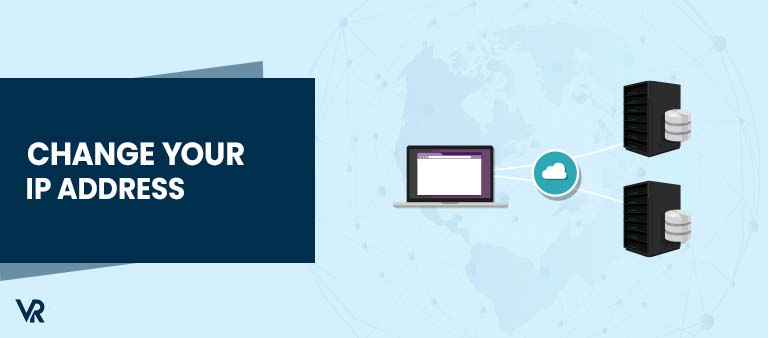
I’ll guide you through the quick Step of, How to change your IP address in USA, to ensure improved online security and privacy. While there are various methods available, through extensive research, I’ve found that the most effective and safest way to change your IP address is through a Virtual Private Network (VPN).
IP address, short for Internet Protocol, is a unique identifier for your device’s online activity. Changing this address is not only legal (when not used for illegal activities) but also essential for those looking to protect their digital footprint or appear as if they’re browsing from another country.
In less than five minutes, you can change your IP address using the best VPN, such as ExpressVPN, for privacy protection and a temporary new IP. Alternatively, manually setting a preferred IP or forcing your device to get a new one automatically are viable options for a quick change without added privacy measures.
Here’s how to change IP address, to enhance your online experience without the need for technical expertise.
How to Change Your IP Address In USA [Quick Steps]
Following are the steps on, how to change IP address, 5 simple steps to easily change your IP address for free are mention below:
- Register with a reputable VPN provider such as ExpressVPN, which offers a range of VPN protocols.
- Download the VPN app and open it on your chosen device(s).
- Pick a server in your preferred country to establish a connection; ExpressVPN offers a vast network of 3000+ servers worldwide.
- Once connected to a server, ExpressVPN will allocate you an IP address from the country you selected.
- Surf the web with confidence, assured that your actual IP address is concealed, safeguarding your privacy.
Pros & Cons of Changing IP Address
Changing your IP address can bring both advantages and disadvantages, including privacy and security benefits, as well as potential complications with accessing certain content or services.
Advantages of Changing Your IP Address
- Avoid Tracking: By changing your IP address, you create a barrier between yourself and third parties who would track you online. Your real IP address can be used to identify your device and location. By changing your IP address, you can close that avenue of traceability.
- Increased Privacy: Changing your IP address can also enhance your online privacy by preventing your ISP, websites, and other entities from tracking your online activities, especially if you’re handling sensitive financial data or personal information.
- Accessing Global Servers: Some websites and services are only available in certain regions. For example, Netflix offers more content in some countries than others. By changing your IP address to another online location, you can access content that would otherwise be inaccessible to you.
- Enhance Safety: When you connect to public Wi-Fi networks, you expose your device to potential security risks, such as hacking and malicious software. By changing your IP address, you can reduce these risks by hiding your real IP address and appearing to be in a different location.
- Circumventing Restrictions: Governments, schools, and workplaces often impose restrictions on internet usage by blocking certain websites or services. By changing your IP address, you can bypass these restrictions by appearing to be in a different location.
Disadvantages of Changing Your IP Address
- Loss of Speed: Changing your IP address can reduce internet connection speed since your data may have to travel further to reach its destination, which can result in increased latency.
- Compatibility Issues: Some websites and services may not work properly if your IP address is changed because they are designed to only work in specific regions, and changing your IP address may result in an error message or a blocked connection. IP address blockers in USA offer a crucial layer of protection, shielding your online activities and personal information from potential threats and ensuring your anonymity on the web.
- Technical Challenges: Changing your IP address can be a complex process for those not familiar with networking and computer systems, and may result in frustration or confusion for non-technical users.
- Possible Security Risks: Changing your IP address can also pose security risks, especially on public Wi-Fi networks or when using an unreliable VPN service resulting in your device being compromised by hackers or malware, or your internet traffic being monitored or intercepted.
- Increased Cost: Changing your IP address can be expensive, especially if you use a premium VPN service. This can make it difficult for budget-conscious users to change their IP address without sacrificing quality or security.
Quick Overview: What Are the Best VPNs to Change Your IP Address?
After extensive research and analysis of 50+ VPNs, I have determined that the following recommended VPNs consistently deliver high-quality performance, security, and reliability. Whether you’re looking to bypass government restrictions, increase privacy and security, or access global content, these VPNs have you covered.
- ExpressVPN: is the best VPN to change your IP address. It offers fast, secure connections, an easy-to-use interface, and over 3000+ servers in 105 countries. Security features include 256-bit encryption and split tunneling. It offers 5 simultaneous connections Prices start at $6.67/mo .
- Surfshark: is an affordable VPN to change your IP address with fast connections and a user-friendly interface. It has a large network of 3200+ servers in 100 countries. Strong security features include strong encryption and a no-logs policy. It offers unlimited simultaneous connections Prices start at $2.49/mo
- NordVPN: is a well-secured VPN service to change your IP address with a large server network of 6000+ servers in 61 countries. Security features include military-grade encryption and obfuscated servers. Prices start at $3.99/mo .
Why Should I Change My IP Address?
Changing your IP address hides your geolocation, protects against hackers, and avoids tracking by websites and ISPs that employ web tracking. Changing your IP address will secure your online activities because it can be used to snoop on your private internet traffic. It can also help in bypassing geo-restrictions and protect your online privacy.
Many online services are restricted based on geography and cannot be accessed outside their home country. The solution is to use a VPN and connect to a server in the desired location, which grants access by providing a valid local IP address. In this manner you can watch HBO Max and MLB.tv Outside USA as well.
Here are some points that explain why you should change your IP address:
- Access geo-restricted online services and content
- Improve online privacy and security
- Circumvent government censorship and internet restrictions
- Protect personal information from being tracked by advertisers
- Prevent hackers from accessing personal data
- Bypass IP-based restrictions on websites and online services
- Hide location for increased privacy
- Enjoy the benefits of a different IP for different purposes (e.g. gaming, streaming)
- Get better prices on online purchases
- Avoid ISP throttling and maintain a stable connection speed.
How to Change Your IP Address
- Using a VPN: One of the easiest ways to change your IP address is using a premium VPN. A VPN acts as IP changer as it creates a secure, encrypted connection to another network, and routes your internet traffic through this connection. This makes it appear as though you are located in another location, with a different IP address.
- Restarting your router: The simplest way to change your IP address is to restart your router. This will often cause your internet service provider to assign a new IP address to your device.
- Contacting your ISP: If you want to change your IP address permanently, you can contact your internet service provider and ask for a new one. This may or may not be possible, depending on the policies of your ISP and the type of internet service you have.
How To Change Your IP Address Manually?
Manually changing your IP address involves modifying the settings of your network adapter. This can be a complex process, especially for those without technical experience. However, following step-by-step instructions can make it a relatively straightforward process. Overall, it can be considered a moderate-level task in terms of complexity.
How to Change IP Address on a Mac
Here are some simple steps to change your IP address on a Mac:
- Open System Preferences and choose “Network“.
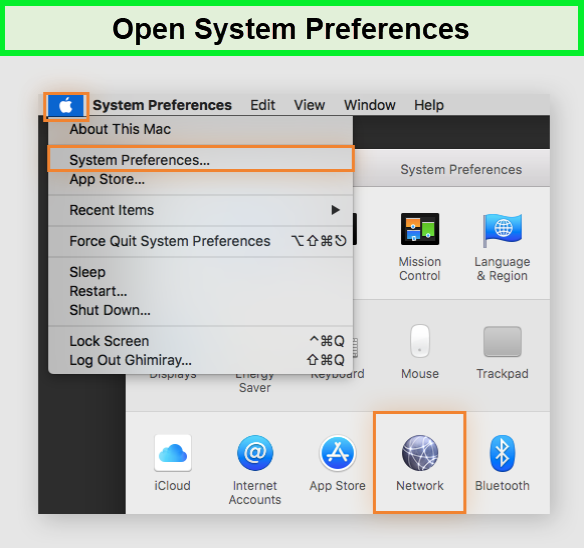
- Click on your network in the left column and select “Advanced“.
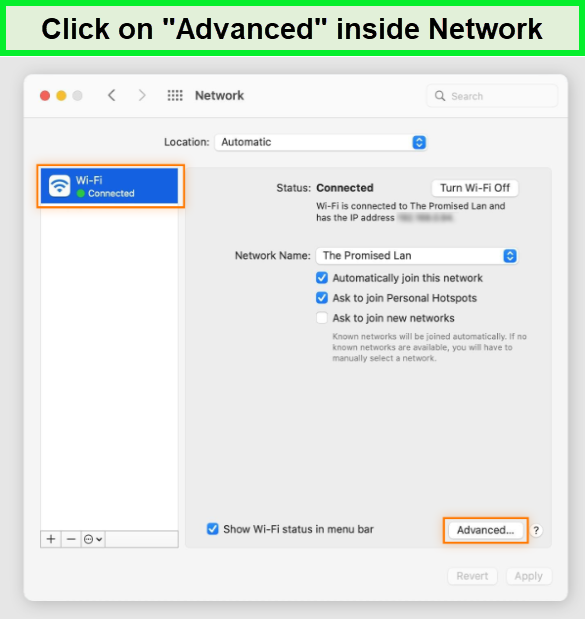
- In the advanced settings, navigate to the “TCP/IP” tab.
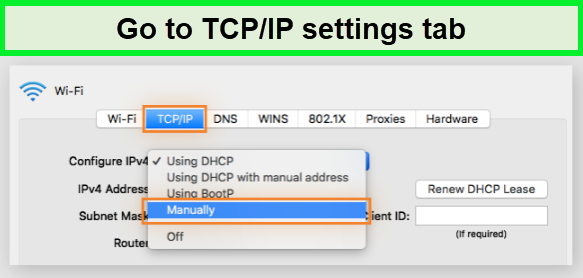
- Under “Configure IPv4 address”, choose “Manually“.
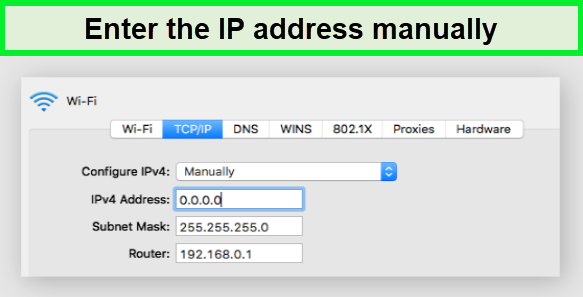
- Enter the desired IP address and click “OK“.
How To Change your IP Address on Windows 10
Here are the steps to change your IP address manually on a Windows platform;
- Navigate to Start, then proceed to Settings and choose Network & Internet.
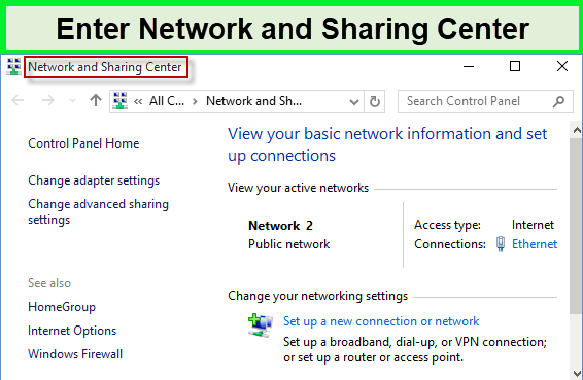
- Under your local area connection, opt for Properties.
- Select “Use the following IP address” and type the IP address you require.
- Configure “Use the following DNS server” and enter the DNS server address.
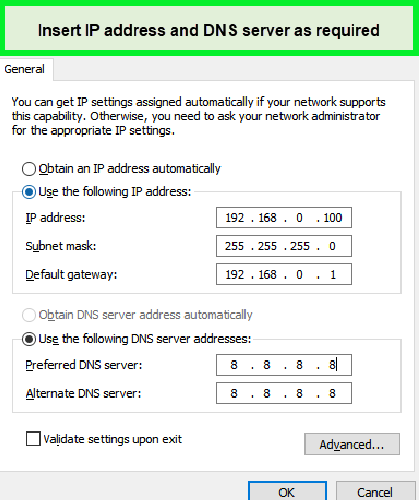
- Select “Validate settings on departure” and click “OK.”
- Your system will conduct network diagnostics and validate your connectivity immediately.
Note: Make sure to use a valid IP address. Incorrect IP address settings may result in loss of internet connectivity.
Automatically Change IP Address
Here are a few ways to change your IP address automatically:
- Use a VPN: Connecting to a VPN can change your IP address as it masks your internet activity by routing it through a server.
- Use a Proxy Server: You can configure your device to connect to the internet via a proxy server, which acts as an intermediary and can change your IP address.
- Use Tor Browser: Tor is a browser that routes your internet traffic through multiple servers, changing your IP address with each hop.
- Restart Your Router: Turning off and then restarting your router can cause your device to be assigned a new IP address by your internet service provider.
- Change Network: Connecting to a different network, such as a different Wi-Fi or cellular network, will give you a new IP address.
Your ISP Always Knows Your IP Address
Despite there being so many methods to change your IP address, one entity from whom it is notoriously hard to hide your IP is your internet service provider. Consequently, your ISP always knows your IP address, location and DNS Queries your device make while using the internet :
- This is because in order for your device to access the internet, your ISP will have to assign you a public IP address to enable you to go online.
- Using automatic and manual methods will hide your IP address from websites, services, and other internet devices, but not your ISP.
- Despite your ISP being able to identify you through your address, you can still hide your data and activity from them by using a VPN or Tor.
- A VPN or Tor will encrypt all your data before it exits your device so even though the ISP will know you are exchanging data, it can not view your data.
- An easy way to hide your activity from your ISP, and change your public IP Address is by switching between your mobile data and wifi alternatively since the two network types usually have different ISPs.
Use a VPN or Proxy Server to Change Your IP Address
A VPN and a proxy server are two common ways to change your IP address. Both methods allow you to hide your original IP address and connect to the internet through a different IP, but they differ in their approach.
A VPN creates a secure, encrypted connection between your device and a server, routing all your internet traffic through that server. This makes it appear as if you are accessing the internet from the server’s location, hiding your original IP address and providing you with a new one. VPNs are ideal for protecting your privacy and security online, especially when using public Wi-Fi. If your mind raised the following question: “Can you change your IP address easily?” then I assure you that there is no easier way to change your IP address than through a VPN.
A proxy server acts as an intermediary between your device and the internet, routing your internet traffic through the server. This also changes your IP address, but it does not provide the same level of security and privacy as a VPN. Proxies are usually used for specific purposes, such as bypassing geo-restrictions or improving page load times.
The solution you adopt should be tailored to your unique requirements. If you want to avoid being tracked while online or bypass a region-based content filter, you’ll need to utilize some alternative strategies. Here’s when a virtual private network (VPN) or proxy server comes in handy.
Choose between VPN or proxy based on need. VPN offers privacy and security, proxy offers speed and affordability. The decision depends on your requirements and priorities.
How to Change Your Router’s IP Address
Simplest way to get a new IP Address is to unplug your router for few minutes, Well Changing the IP address of a router can vary in difficulty depending on the user’s level of technical expertise. It may be more complex and require a better understanding of network configurations and router settings.
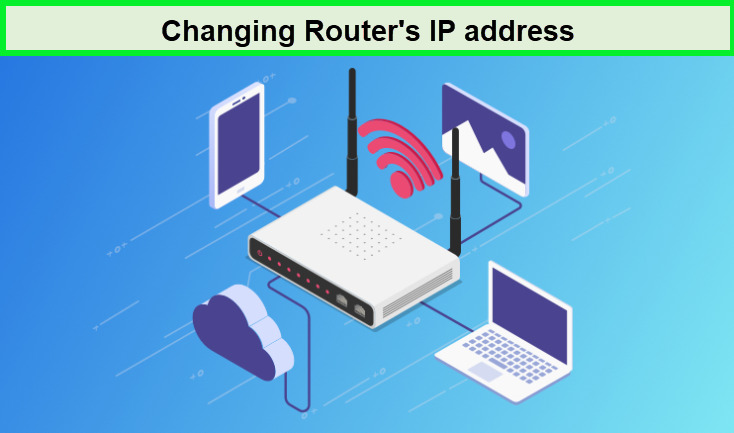
In either case, it is important to carefully follow the instructions provided by the manufacturer and refer to the router’s user manual for guidance. To change the IP address of your router, follow these steps:
- Access Router: Log into your router’s web interface through a web browser by entering its IP address in the address bar.
- Locate IP Configuration: Navigate to the network settings or IP configuration section of your router’s interface.
- Change IP Address: Look for the option to change the IP address and enter the desired new IP address.
- Save and Restart: Save the changes and restart the router for the new IP address to take effect.
Note: The exact steps to change the IP address of a router may vary depending on the model and manufacturer. Be sure to consult the router’s user manual for specific instructions.
How to change IP on your iPhone?
Follow these steps to change IP address on your iPhone:
- Access the Settings on your iOS device.
- Navigate to the Wi-Fi section.
- Locate and tap on the Network you’re currently connected to.
- Choose the IPv4 Address option.
- Select Configure IP.
- Input your desired IP address.
Note: Changing the IP address on iPhone may not be necessary for most users, as the device is typically assigned an IP address automatically by the router. Consult with your network administrator before making any changes to your IP address configuration.
How to change IP Address on Android?
If you want to know how to change Android IP address, follow these steps:
- Open “Settings” on your Android phone and tap on “Network & Internet“.
- Tap on “Wi-Fi” and connect to the network you want to change the IP address for.
- Tap and hold on the network name, then select “Modify network“.
- Scroll down to “Advanced options” and tap on “IP settings“.
- Change the IP settings from “DHCP” to “Static”.
- Enter the desired IP address, subnet mask, gateway, and DNS information.
- Save the changes and reconnect to the Wi-Fi network to change IP location.
Note: The exact steps to change the IP address on Android phone may vary depending on the device and manufacturer. It is important to carefully follow the instructions provided by the manufacturer and refer to the device’s user manual for guidance.
Related VPN Guides By VPNRanks
- Public vs Private IP address: Investigate the contrast between public and private IP addresses.
- What is my private IP address: Acquire knowledge about private IP addresses and learn how to identify your private IP address.
- Change Ubuntu IP address: Change Ubuntu address effortlessly for enhanced privacy with VPN.
- Change Mac IP address: Change Mac IP addresses easily with the VPNs.
FAQs: Change Your IP Address
How to change a public IP address?
Your public IP address can be changed by resetting your router or contacting your ISP . Another option is to use a VPN, which routes your internet traffic through a server with a different IP address. Note that some ISPs use dynamic IP addresses that change regularly, so your public IP may change without taking any action.
What does it mean to change your IP address?
Changing your IP address involves changing the unique number of your device on the network, which is usually done to ensure privacy, security, or access to specific information. When your IP address changes, your server’s DNS entry is automatically updated, ensuring that users can still connect to your service with your domain name, and this simple change even time having a new IP address helps you access the internet.
Why does changing my IP address catch CAPTCHA requests ?
It Causes because the IP address you are using isn’t unique and is probably shared among several other users. An online service like Google usually notices an unusually high volume of requests coming from the same IP address because it stands out as suspicious behavior to its monitoring algorithms. It, therefore, asks you to complete CAPTCHAs in an effort to confirm that you are a human and not a robot.
Will a free VPN change my IP address?
Yes, a free VPN can change your IP address but have drawbacks like low monthly bandwidth and slow speeds due to high user traffic. They may not provide adequate privacy protection, with some falsely claiming to follow no-logs policies or exaggerating their capabilities. It is best to opt for a reputable, no-logs VPN provider that guarantees security and provides easy ways to change your IP address.
Is it illegal to change my IP address in USA ?
No. Changing your IP address is not unlawful. It’s true that using a VPN is perfectly legal and not looked upon in the vast majority of countries. Some online actions, however, will still be unlawful even if you use a VPN to mask your IP. Such activities include the downloading of copyrighted content through torrents and, in some jurisdictions, the use of online gambling sites.
Can I change my IP address myself?
Yes, you can change your IP address yourself. You can achieve this by employing various methods, such as utilizing a VPN, proxy, adjusting your router settings, or configuring it directly from your device settings.
Can someone else change my IP address?
Well, No, another person cannot change your IP Address, but there is a possibility that someone can, through hacking, employ a method known as IP spoofing to disguise their traffic origin and make it appear to originate from a different IP address.
Can you get a new IP address from ISP in USA?
Yes, you can get a new IP address from your ISP, but it depends almost completely on your ISP’s cooperation. If your ISP does not accept your request to change your IP address, you can try using other ways to obtain a new IP address, such as restarting your router, using a DNS, or the easiest: using a reliable VPN. can you get a new ip address
Can I change my IP address for free?
Yes, you can change your IP Address for free by utilizing the Tor Browser or public Wifi .these are the few option to change IP address for free ,However getting a free IP Address through a public Wi-Fi networks, might expose your device to potential security risks,
Does resetting my router change my IP address?
Yes, resetting your router will change your IP address, but it depends upon the time you leave it turned off before turning it on again. It should be noted that this strategy simply yields a new dynamic (constantly changing) IP address, not a static one.
The choice between using a Static addresses vs. dynamic IP addresses in USA depends on whether you need a manually configured, unchanging address (static) or an automatically assigned, potentially changing one (dynamic) for your network devices.
Does VPN change IP address permanently?
No, a VPN does not change your IP address permanently. When you connect to a VPN server, it assigns you a temporary IP address from its pool of addresses associated with that server. This temporary IP address is used while you are connected to the VPN. Once you disconnect from the VPN, your device reverts to using its original IP address provided by your internet service provider (ISP). So, the change in IP address is only temporary and lasts as long as you are connected to the VPN.
Wrapping Up
In this article, I have tried to address the question of how to change your IP address using easy steps. You can change your IP address in several ways, depending on your needs and the type of IP address you have.
If you have a dynamic IP address, resetting your router is a quick and easy solution that will give you a new IP assigned by your ISP. If you have a static IP, you may need to contact your ISP to request a change.
Another option to change your IP address is to use a VPN like ExpressVPN. VPNs allow you to route your internet traffic through a server with a different IP address, providing added privacy and security features. To change IP address with VPN, it is important to consider the provider’s privacy policies and security measures to ensure your online activities are protected.
Overall, changing your IP address can offer benefits such as improved privacy, and security, and bypass geographical restrictions on content. It is important to weigh your options and choose the method that best suits your needs, whether it is resetting your router, contacting your ISP, or using a VPN.
